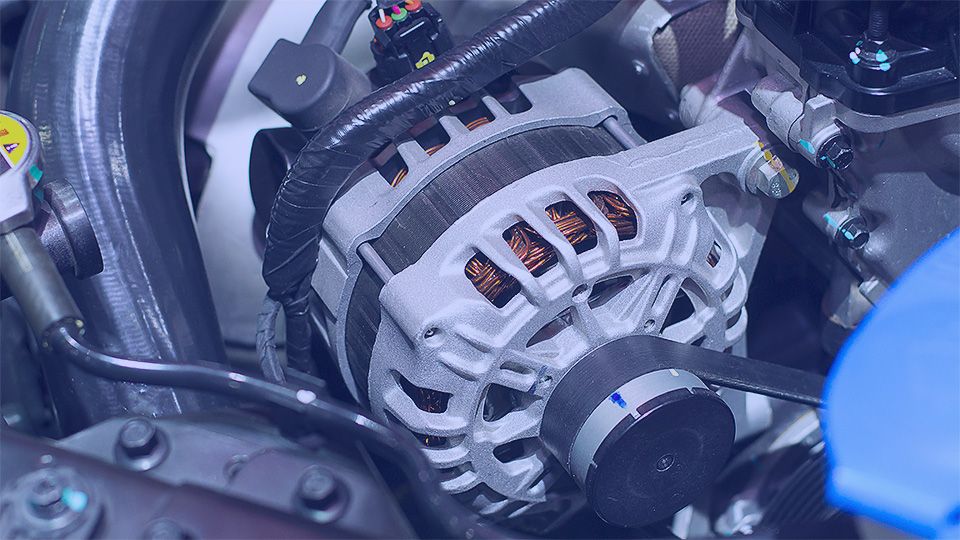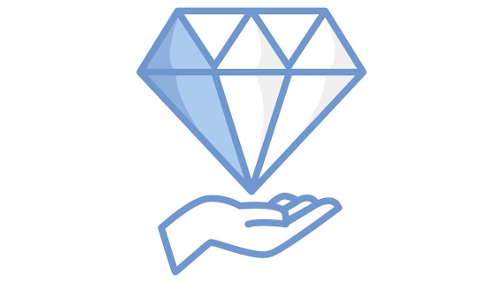
An Insight into Electric Motors
Basic knowledge, and the rough design and evaluation of common types of motor

Acquire in-depth knowledge of the structure and mode of operation, of typical types of electric motor and their areas of application. This training is offered as a 2-day course.
Duration
2 days
Prerequisites
None
Software used
Software-independent
- Familiarization with vehicle electric drive systems
- Understand the design, mode of action, and operating characteristics of electric machines
- Draw up a rough layout of various electric machines with their main dimensions
- Estimate relevant variables such as installation space and material costs
Description
Electric traction motors and their integration into electrically driven road and rail vehicles are essential elements when it comes to successful development of electromobility into the future. However, the electric motor is at the center of new developments not only in electric mobility, but also in many other industrial applications. Companies that want to survive in the market must produce small, power-dense, efficient, and inexpensive motors and systems. Ever shorter development cycles demand very fast design-related decisions. Sound knowledge of the basic design, mode of operation, and advantages and disadvantages of different types of motors is essential if the correct decisions are to be taken.
On this course you will get an overview of the functionality, strengths, and weaknesses of common types of motor (PMSM, SRM, IM, ESM, GSM, and TFM). Together, we will create a rough design incorporating the main dimensions of the motor and its torque-speed characteristics, which will help you to assess, for example, how large the installation space needs to be for the required motor output and how much material you will need when it comes to production. The course is aimed at design engineers, developers, and decision-makers from the fields of drive technology, mechanical engineering, and mechatronics. Likewise, electrical engineers and motor designers will be able to refresh their knowledge.
Detailed agenda for this 2-day training
Day 1
01 Fundamentals and trends in electromobility
- Components of the electric drive train
- Limits, problems, benefits, advantages, and disadvantages of electric vehicles
- Comparison of a VKM vehicle and an electric vehicle with the same range
- Tractive resistance and driving cycles
- Estimation of power, torque, and speed requirements
02 The basics of electrical machines
- Primary electrical and magnetic quantities
- Faraday's law of induction, and the Lorentz force
- The design and operation of a polyphase machine
- DC chopper and inverter
03 Mode of operation and comparison of common motor types
- PMSM and ESM (permanent and electrically excited) synchronous machines
- Asynchronous machine with an ASM short-circuit squirrel cage rotor
- SRM switched reluctance machine
- GSM direct current machine and TFM transverse flux machine
04 Operating characteristics of electrical machines
- Efficiency and control characteristic
- PSM synchronous machine (Id and Iq control)
- Asynchronous machine with an ASM short-circuit squirrel cage rotor
- SRM switched reluctance machine
Day 2
05 Thermal analysis and mechanical design
- Operating modes, and losses in electrical machines
- Cooling concepts, from low-budget to high-end
- Insulation systems, temperature classes, and thermal limits
- Operating modes (continuous and short-time duty)
- Mechanical limits
06 Testing of electrical traction machines
- Test standards (EN 60349)
- Routine testing, type testing, end-of-line testing, special tests
- Loss distribution
- Metrological fundamentals
07 Current developmental trends
- Technical and economic comparison of individual electric motors
- Cost structures of machines and electric drive trains
- Developmental trends in highly utilized electric motors, especially in relation to traction machines
08 Analytical design of an electric motor
- Performing calculations using Esson's equation
- Rough design of either an ASM or a PSM
- Calculation of main dimensions and torque - speed regulation characteristic
Your Trainers

Univ.- Prof. Dr.phil. Dr.techn. habil. Harald Neudorfer
Placement in the CADFEM Learning Pathway
Participant data
Additional information
Commentary
Whether eLearning, classroom courses, live online training or customized workshops - together we identify the best option for you.
Included Training Material
As training participant will receive your personal copy of the book Weiterentwicklung von elektrischen Antriebssystemen für Elektro- und Hybridstraßenfahrzeuge written by the trainer and course author Univ-Prof. Dr.phil. Dr.tech. habil. Harald Neudorfer.

Do you have questions on the training?
If you book through your university, you will receive a 50% discount on the stated fee on training courses and eLearning courses.
For more information on the validity and how booking with the code ACADEMIC50 works, please visit our page on training for academic users.
Straight after you sign up, an automatic confirmation of receipt will be sent to the email addresses you provided. Once you have successfully verified the data you provided, you will receive your personalized sign-up confirmation, containing further information on course fees, the billing address, etc., by email within two to three working days.
As soon as the minimum number of attendees has been reached, you will receive a final training confirmation containing further information. If you have booked an on-site training, we recommend that you wait until you have received this final confirmation before booking your travel and accommodation.
If the minimum number of attendees is not reached, we reserve the right to cancel the training seven days before it is due to start at the latest. We are happy to inform you on changing your booking to an alternative date. Please note that we accept no liability for hotel or travel bookings that attendees have already made.
Usually the training courses start at 9:00 am and end at 5:00 pm of the respective local time. The actual course times will be stated in the booking confirmation. Please note that, depending on the training host, there may be a possible time shift between your and the provider's local time. Therefore all local times are provided with the valid time shift to Greenwich Mean Time (GMT).
The training includes intermediate and final exercises to practice the elements covered in the training. The trainer will present the resolution of these exercises and will check the good understanding of each module of the course with the help of MCQ. A training certificate will attest to the validation of the knowledge assessment for each module and for the overall training.

Disability and Quality Referent




